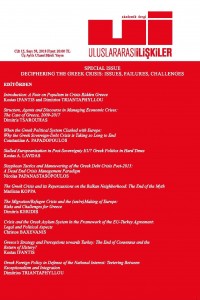Abstract
Bu çalışma, kriz içindeki Yunanistan’ın ulusal çıkarını nasıl tanımladığı ve savunduğunu açıklamayı amaç edinmektedir. Ekonomik ve göç krizlerinin yarattığı zincir etkisi Yunanistan’ı, küresel düzenin artan dönüştürücü etkisi altındaki değişimlerle birlikte, NATO ve AB’de sertliği içeren araçlarını kullanmaya mecbur bıraktı. Türkiye’ye yönelik caydırıcılık öncelikli olmakla birlikte, Yunanistan’ın NATO ve AB, içerisindeki konum ve saygınlığını yeniden kazanması için bu iki örgüt arasında dengelemeyi öngören geleneksel politikasından uzaklaşması ve diğer birçok ülkeden farklı olarak Rusya ile ilişkilerine daha hassas bir yaklaşım göstermesi gerekti. Bu politika, istisnacılığın ve etno-merkezciliğin sürekliliğine rağmen, Avrupa-Atlantik bağlamından uzaklaşmayı bir olumsuzluk gören stratejik gerçekçilik politikasının ana akım politik spektrumu üzerinden kabulü ile yapıldı. Kanat ülke olma konumunun yanı sıra değişen ve giderek daha da marjinalleşme ihtimali olan Türkiye ile komşu konumu Yunanistan’ın komşularıyla ilişkilerde yapıcı bir gündemi ortaya koymasına da fırsat verdi.
References
- ......
Greek Foreign Policy in Defence of the National Interest: Teetering between Exceptionalism and Integration
Abstract
This paper aims to explain how crisis-ridden Greece defines and defends its national interest. The constellation of the twin economic and migration crises coupled with the increasingly transactional nature of the global order have forced Greece’s hand in sticking to its guns with regard to its membership in both NATO and the European Union. While deterrence vis-à-vis Turkey remains a high priority, Greece has had to labour to regain its status and credibility within both aforementioned organizations by evolving away from its traditional policy of balancing between its membership obligations in NATO and the EU and its more nuanced approach to relations with Russia in contrast to many other countries. This has been done with the consensual adoption across the mainstream political spectrum of a policy of strategic realism which sees a distancing from the Euro-Atlantic context as an anathema, albeit the persistence of the reflex of exceptionalism and ethno-centrism. Its flank state status and the danger of further marginalization at a time of a changing Turkey have forced its hand while also presenting opportunities for the adoption of a renewed positive agenda with its neighbours.
References
- ......
Details
| Primary Language | English |
|---|---|
| Journal Section | Articles |
| Authors | |
| Publication Date | June 1, 2018 |
| Published in Issue | Year 2018 Special Issue: Deciphering the Greek Crisis: Issues, Failures, Challenges |


